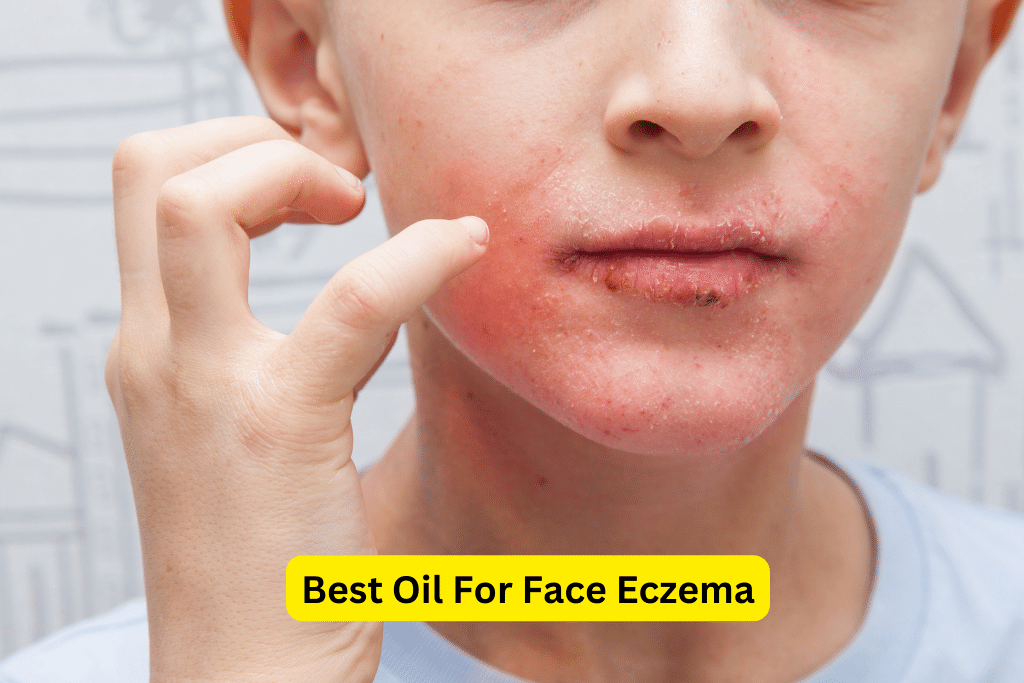Expert Tips for Choosing the Best Oil to Soothe Face Eczema
Best Oil For Face Eczema
Face eczema is a common skin condition that affects many individuals. It is characterized by red, inflamed, and itchy patches on the face. This condition can be caused by a variety of factors, including allergens, irritants, and genetic predisposition. The symptoms of face eczema can range from mild to severe, and they can significantly impact a person’s quality of life. Luckily, there are many natural remedies available to help soothe and heal face eczema, one of the most effective being oils.
Using oils for face eczema can provide numerous benefits, including gentle and natural treatment, moisturizing and healing properties, as well as anti-inflammatory and anti-itch properties. In this comprehensive guide, we will explore the different types of oils that can be used to treat face eczema, the benefits they offer, and tips for incorporating them into your skincare routine.
The Benefits of Using Oils for Face Eczema
One of the main advantages of using oils for face eczema is that they provide a natural and gentle alternative to harsh chemical treatments. Many over-the-counter treatments for eczema contain ingredients that can further irritate the skin, especially if it is already sensitive due to the condition. Oils, on the other hand, are derived from natural sources and are often well-tolerated by the skin.
Oils also have healing and moisturizing properties, which can help to soothe and repair the skin barrier. When the skin barrier is compromised, as is often the case in individuals with eczema, it can lead to increased dryness, itching, and inflammation. Oils help to lock in moisture and provide a protective layer on the skin, allowing it to heal.
In addition, many oils have anti-inflammatory and anti-itch properties, which can provide relief from the discomfort associated with eczema. These properties can help to reduce redness, swelling, and itchiness, making the condition more manageable.
Understanding Different Types of Oils for Face Eczema
There are two main types of oils that are commonly used to treat face eczema: essential oils and carrier oils.
Essential Oils
Essential oils are highly concentrated oils derived from plants. They are known for their powerful therapeutic properties and pleasant aromas. When using essential oils for face eczema, it is important to dilute them with a carrier oil to prevent skin irritation. Here are a few essential oils that are beneficial for treating face eczema:
Lavender Oil
Lavender oil is one of the most popular and versatile essential oils. It has numerous benefits for face eczema, including its anti-inflammatory, antimicrobial, and calming properties. It can help to reduce inflammation, soothe irritated skin, and promote healing. Lavender oil can be applied topically by diluting it with a carrier oil and gently massaging it onto the affected areas of the face.
Chamomile Oil
Chamomile oil is another excellent choice for treating face eczema due to its anti-inflammatory and calming properties. It can help to reduce itching and redness, while also promoting healing. Chamomile oil can be applied topically by diluting it with a carrier oil and gently patting it onto the affected areas of the face.
Tea Tree Oil
Tea tree oil is well-known for its antimicrobial and anti-inflammatory properties. It can help to reduce inflammation and prevent infection in eczema-prone skin. However, tea tree oil should always be used with caution, as it can be irritating to some individuals. It is important to properly dilute tea tree oil with a carrier oil before applying it to the face.
Carrier Oils
Carrier oils are derived from the fatty portion of plants and are used to dilute essential oils. They have their own benefits for the skin and can help to enhance the effects of essential oils. Here are a few carrier oils that are beneficial for treating face eczema:
Jojoba Oil
Jojoba oil is a popular choice for individuals with eczema because it closely resembles the skin’s natural sebum. It has excellent moisturizing and healing properties, and it can help to restore the skin barrier. Jojoba oil can be applied topically by gently massaging it onto the affected areas of the face.
Rosehip Seed Oil
Rosehip seed oil is rich in antioxidants and essential fatty acids, which can help to repair the skin and reduce inflammation. It is also known for its ability to fade scars and promote a more even skin tone. Rosehip seed oil can be applied topically by gently patting it onto the affected areas of the face.
Coconut Oil
Coconut oil is a versatile oil that has antimicrobial and moisturizing properties. It can help to reduce inflammation and soothe irritated skin. However, some individuals with eczema may be sensitive to coconut oil, so it is important to patch test it before applying it to the face.
Factors to Consider When Choosing an Oil for Face Eczema
When choosing an oil for face eczema, there are several factors that you should consider:
Allergenic Potential
Some individuals with eczema may have allergies or sensitivities to certain oils. It is important to research and patch test any new oil before applying it to the face. If you experience any redness, itching, or other signs of irritation, discontinue use immediately.
Individual Skin Type and Sensitivity
Every individual’s skin is unique, and what works for one person may not work for another. It is important to consider your skin type and sensitivity when choosing an oil for face eczema. If you have very sensitive skin, you may want to opt for oils that are known for their gentle properties, such as lavender or chamomile oil.
Source and Quality of the Oil
The source and quality of the oil can greatly impact its effectiveness. Look for oils that are organic, cold-pressed, and free from additives or synthetic fragrances. These oils are often of higher quality and retain more of their beneficial properties.
Personal Preferences and Considerations
Lastly, consider your personal preferences and lifestyle when choosing an oil for face eczema. Some individuals prefer oils with a lighter texture, while others prefer oils that absorb quickly into the skin. Additionally, if you have any specific dietary restrictions (such as avoiding nut-derived oils), be sure to choose an oil that aligns with your needs.
Tips for Incorporating Oils into Your Skincare Routine
When incorporating oils into your skincare routine to treat face eczema, it is important to follow these tips:
Patch Testing and Sensitivity Considerations
Before applying a new oil to your face, it is crucial to conduct a patch test on a small area of skin first. This will help you determine if you have any allergies or sensitivities to the oil. Apply a small amount of diluted oil to the inside of your wrist or elbow and wait 24 hours. If no redness, itching, or irritation occurs, it should be safe to use on your face.
Proper Application Techniques
When applying oils to your face, it is important to do so gently and with clean hands. Use your fingertips to massage the oil onto the affected areas, using circular motions. Avoid rubbing or pulling on the skin, as this can exacerbate inflammation and irritation.
Recommended Frequency of Use
The frequency of oil application will vary depending on your individual needs and the severity of your eczema. Some individuals may benefit from applying oil once or twice daily, while others may find it helpful to use it more frequently. Start with a smaller frequency and gradually increase if needed, noting how your skin responds.
Combining Oils with Other Skincare Products
You can enhance the benefits of oils by combining them with other skincare products, such as moisturizers or serums. For example, you can mix a few drops of oil into your regular moisturizer or apply it after using a hydrating serum. This can help to lock in moisture and provide additional benefits for your skin.
Additional Natural Remedies for Face Eczema
In addition to oils, there are several other natural remedies that can be beneficial for treating face eczema:
Aloe Vera
Aloe vera has soothing and anti-inflammatory properties, making it an excellent choice for individuals with face eczema. Apply a small amount of pure aloe vera gel to the affected areas of the face for relief.
Oatmeal
Oatmeal has anti-inflammatory and skin-soothing properties. You can create a gentle oatmeal face mask by mixing finely ground oatmeal with water or a carrier oil, and applying it to the face for a few minutes before rinsing off.
Calendula
Calendula is a flower that has been used for centuries to heal and soothe the skin. You can find calendula in various forms, including creams, ointments, and herbal teas.
Honey
Honey has antimicrobial and healing properties, and it can help to reduce inflammation and promote healing in eczema-prone skin. Apply a thin layer of raw honey to the affected areas of the face and leave it on for 10-15 minutes before rinsing off.
Precautions and Warnings
While oils and natural remedies can be beneficial for treating face eczema, it is important to exercise caution and seek professional advice when necessary:
Consultation with a Dermatologist or Healthcare Professional
If you are unsure about which oils or natural remedies to use for face eczema, it is always best to consult with a dermatologist or healthcare professional. They can assess your specific condition and provide personalized recommendations.
Potential Side Effects or Allergies
While oils are generally safe to use, some individuals may experience side effects or allergies. If you experience any adverse reactions, such as increased redness, itching, or swelling, discontinue use immediately and seek medical attention if needed.
Discontinue Use if Symptoms Worsen or Persist
If your face eczema symptoms worsen or persist despite using oils or natural remedies, it is important to stop using them and consult with a healthcare professional. They can help determine the underlying cause of your symptoms and develop an appropriate treatment plan.
Conclusion
Using oils for face eczema can provide numerous benefits, including natural and gentle treatment, healing and moisturizing properties, as well as anti-inflammatory and anti-itch properties. By understanding the different types of oils available, considering important factors when choosing an oil, and incorporating oils into your skincare routine properly, you can effectively soothe and heal face eczema. It is important to remember that consistency is key, as well as seeking professional advice when needed. With the right oil and skincare routine, you can find relief and achieve healthier, happier skin.
"Have You Seen Mike Walden's new holistic acne System yet? It's called "Acne No More" I've read the whole thing (all 223 pages) and there's some great information in there about how to naturally and permanently eliminate your acne without drugs, creams or any kind of gimmicks. I highly recommend it - it's very honest and straightforward without all the hype and b.s. you see all over the net these days. Here's the website where you can get more information:
Click Here -->AcneNoMore









